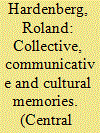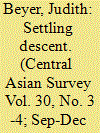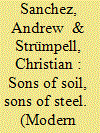|
|
|
Sort Order |
|
|
|
Items / Page
|
|
|
|
|
|
|
| Srl | Item |
| 1 |
ID:
115816


|
|
|
|
|
| Publication |
2012.
|
| Summary/Abstract |
In recent years several historical publications have appeared in Kyrgyzstan which are far from homogeneous in terms of style, form and content. In this article, two very different local histories written by Kyrgyz authors from the same village are analysed and compared. The first author is a former kolkhoz president who produced two books that basically cover the time from the end of the nineteenth to the end of the twentieth century. His work is strongly (auto)biographical and focuses on individual achievements and personal experiences. The second author is a mathematician who wrote two books about the history of his own descent category (uruu). His work combines oral history (sanjyra) with written sources. The two authors create very different images of 'esteemed people' (ardaktuu adamdar), yet they exhibit a common interest in producing a narrative that links the deeds of one's own people (family or descent group) with the history of particular places (pastures, villages or regions). Taking up these observations, the author argues that local histories relate to different types of memory and are far from uniform with regard to their composition, sources, methods and narrative strategies. Yet, despite their diversity, the newly developed genres of 'written collective memory' provide the idea of social continuity by stressing connections between past and present, and between people, land and morality. This may indeed be one reason why collective memories, which were suppressed for many decades, have become so popular in times of rapid social transformation.
|
|
|
|
|
|
|
|
|
|
|
|
|
|
|
|
| 2 |
ID:
107544


|
|
|
|
|
| Publication |
2011.
|
| Summary/Abstract |
This article explores how the inhabitants of two villages in northern Kyrgyzstan relate to one another and to their environment in terms of both place and genealogy. By performing relatedness, people make claims upon a physical landscape, while their relationships are simultaneously shaped by perceptions of the particular place they live in. The term 'settling descent' evokes this dialectic, in which people 'settle' descent in a literal sense in rituals, statues, objects and the stories they tell about the past and the present. The often-repeated academic opposition of 'identity through kinship' vs. 'identity through locality' is resolved by showing how both are aspects of the same historical process. The paper draws on oral histories of key informants, ethnographic case studies and classical as well as recent literature on kinship, place, post-socialism and the anthropology of Central Asia.
|
|
|
|
|
|
|
|
|
|
|
|
|
|
|
|
| 3 |
ID:
141076


|
|
|
|
|
| Summary/Abstract |
Inspired by E. P. Thompson's modelling of class as the contingent outcome of historical processes, this paper explores how autochthony and descent came to inform the boundaries of industrial workforces in the Indian steel towns of Jamshedpur and Rourkela. We suggest that if class is a historical object, then it relates to other forms of power and identity in ways that question the use of rigid analytic typologies. In the private sector Tata company town of Jamshedpur, an industrial working class was constructed during the late colonial period from labour migrants, whose employment became heritable within families. In the public sector Rourkela Steel Plant, founded in the mid-twentieth century, the politics of ethno regionalism coincided with state development policy to inform employment reservation for autochthons. Through a historical analysis of urbanization, migration and employment policy, we consider how elite workforces that bound themselves according to the principles of autochthony and descent were formed in the social laboratories of India's steel towns. We suggest that such processes demand a class concept that engages more subtly with the work of E. P. Thompson.
|
|
|
|
|
|
|
|
|
|
|
|
|
|
|
|
|
|
|
|
|